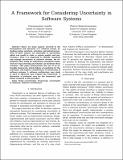A framework for considering uncertainty in software systems
Abstract
There are many aspects involved in the development and operation of a software system, including system artefacts, activities, and infrastructure. Most of these aspects are vulnerable to uncertainty, which can result in risks to system quality and performance. Thus it is important to identify, represent and manage uncertainty in software systems. We hypothesise that using an underlying conceptual framework for characterising uncertainty can facilitate these activities. This paper demonstrates the use of an extensible framework, which defines a foundation for the systematic and explicit consideration of uncertainty in software systems. A software architecture case study is used to illustrate and evaluate the framework. A discussion of potential uses for the framework and future research is also provided.
Citation
Lupafya , C & Balasubramaniam , D 2022 , A framework for considering uncertainty in software systems . in H V Leong , S S Sarvestani , Y Teranishi , A Cuzzocrea , H Kashiwazaki , D Towey , J-J Yang & H Shahriar (eds) , Proceedings - 2022 IEEE 46th Annual Computers, Software, and Applications Conference (COMPSAC) . , 9842720 , Proceedings - International Computer Software & Applications Conference , IEEE Computer Society , Computers, Software & Applications in an Uncertain World (COMPSAC 2022) , 27/06/22 . https://doi.org/10.1109/compsac54236.2022.00241 conference
Publication
Proceedings - 2022 IEEE 46th Annual Computers, Software, and Applications Conference (COMPSAC)
ISSN
0730-3157Type
Conference item
Rights
Copyright © 2022 IEEE. This work has been made available online in accordance with publisher policies or with permission. Permission for further reuse of this content should be sought from the publisher or the rights holder. This is the author created accepted manuscript following peer review and may differ slightly from the final published version. The final published version of this work is available at https://doi.org/10.1109/COMPSAC54236.2022.00241.
Description
Funding: This work is partly funded through a PhD studentship to the first author by the School of Computer Science, University of St Andrews.Collections
Items in the St Andrews Research Repository are protected by copyright, with all rights reserved, unless otherwise indicated.

